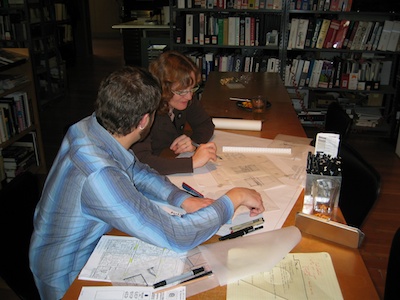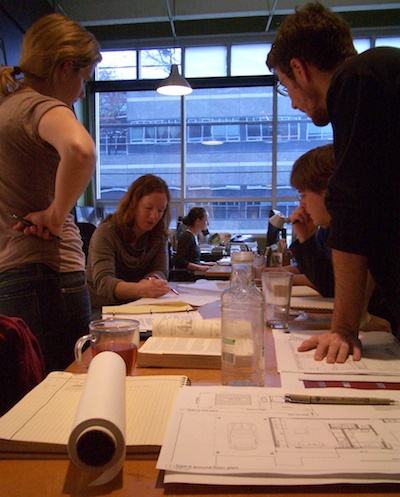Choosing an architect for any building project is an important step. Your architect will be your interpreter, agent, and advisor through the entire arc of the project’s creation. This person should be able to listen, reflect, communicate, and collaborate with you and the design team - ultimately creating architecture that captures the best of what everyone involved brings to the project.
Architecture is a complex practice. Individual architects each have their own unique skills and interests. In order to find an architect with whom you’ll be successful, consider the following.
Websites and Portfolios
A good place to start is the web. Do some searches; see who is appealing to you, whose work and presentation style draw you attention, and who you think you might enjoy working with. Look past the specific projects they show to find common themes and values. Don’t limit your search specifically to architects’ websites. News articles, blog posts, Instagram, and other sources can lead to good people, as well.

Research and References
Ask around about the firms that interest you. Look for published work, ask friends and family if anyone’s used them, get some background and see where that leads you. Ask other building professionals that you trust for referrals: if you have a friend who’s an engineer, or you know a great builder, they may be able to recommend an architect. You can look at awards programs for winners, the papers and magazines, and the professional organizations including the AIBC (Architecture Institute of British Columbia) RAIC (Royal Architecture Institute of Canada) and the GVHBA (Greater Vancouver Homebuilders’ Association.)
Interviews
This, of course, is the critical step. Choose a short list of firms to interview. Generally, three is enough, though that’s entirely up to you. In the interview, you have a chance to test things out.
Communication
How easily are you able to talk with this architect? Is s/he listening, asking questions, and understanding your ideas? Do you feel comfortable sharing the kinds of details that you’ll need to, in order to create a successful project? Your architect often ends up knowing some surprisingly intimate details of your life. Like a good attorney, s/he’ll keep that information strictly confidential. If there is any one key element to choosing an architect, your comfort that the communication is clear and fluid may be it.
Of course, design communication is not strictly verbal. Take a look at the architect’s work. Can you understand - or does s/he clearly explain - what’s shown in drawings, models, and renderings? How well does s/he help you visualize things that aren’t yet on paper?
Expectations
Clear expectations support good communication. Make sure your architect gives you a solid understanding of the design process as s/he sees it for your project. Your architect should let you know what to expect: we can’t see into the future, but an experienced architect can provide estimates of timelines and design fees, and outline how s/he’ll bill for the work. If the architect has a firm of more than one or two people, be sure to meet the people who will be primarily responsible for your project. Be clear about your timeline and budget parameters, and expect your architect to be frank about his or her perspective on these items.

Services
Architects can provide a wide range of professional services, from providing hourly design consultations and quick advice to developing full working drawings and seeing a project through construction. Talk with your architect about the scope of services provided, the costs and benefits of these, and specific recommendations for your project. Find out if the architects you’re considering have builders and consultants to recommend, and whether they’re open to working with people new to them.
Collaboration
Architects are trained to see the big picture - to set down touchstone concepts and develop plans that bring together client requirements, aesthetics, efficiency, and sustainability, and the visions of diverse stakeholders. Your architect should be a creative problem solver who can resolve diverse perspectives into solutions that all parties can enthusiastically support. Your participation and trust are crucial for success, so be sure that you’re ready to contribute.
Some architects are very interactive as they design, and like to work closely with clients at every step; others may disappear for a little while and return with proposals. At different stages of the process you may experience both of these even with one architect; and we frequently adjust to match the needs and preferences of our clients. Ask questions, be ready to do your part, and choose someone whose work style meshes with your own.
Design
Architects can work with a wide variety of design input from you. Don’t worry if you don’t know what your place will look like in the end when you start the process. Sometimes it’s better if you don’t! Clips of projects you like are great, but some of the most successful projects at PLACE have started with even less. If you can say “I’d like my place to feel like ___”; a good architect can take that and start running with it.
It’s also absolutely crucial that you feel comfortable saying, “You know, I really don’t like that.” Architects are trained to take feedback, both positive and negative, and turn it into new ideas. Please, never be afraid to tell us what you think.
The Choice
There will be challenging patches - there are in every project. If you find an architect whose past work appeals to you, who listens and accurately reflects what you’ve said, who is someone you can talk about money and the details of daily life with, and whom you feel is fair and professional; then you’re in for a fantastic adventure. Good luck and welcome.